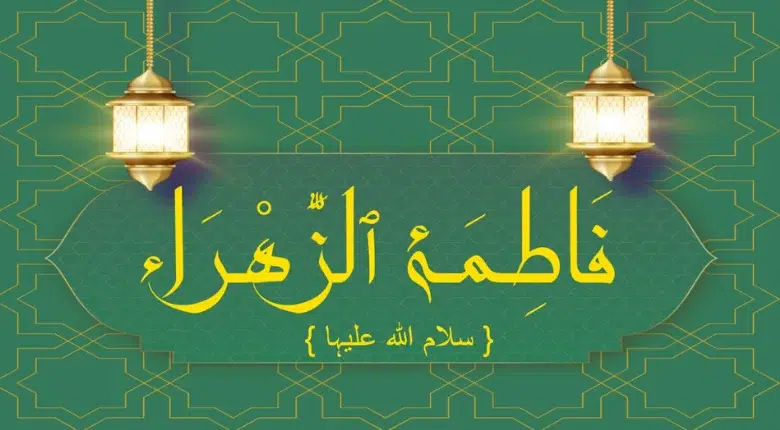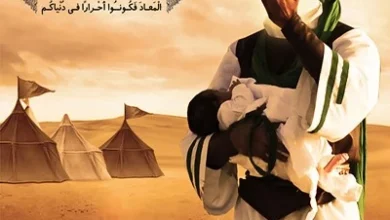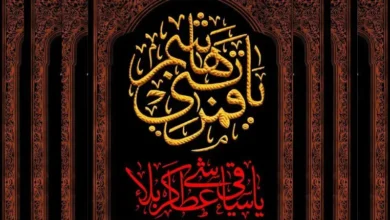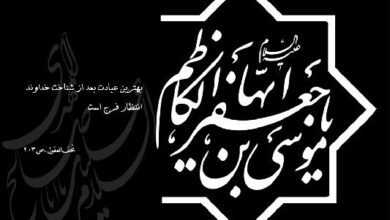
Agnomen: Ummu ‘l-A’immah.
Father’s name: Muhammad ibn `Abdillah.
Mother’s name: khadijah bint khuwaylid.
Birth: Born in Mecca of Friday, 20th jumada ` th-thaaniyah in the fifth year after the declaration of the prophet – hood (615 AD).
Death: Died at the age of 18 in Medina on 14th Jumada ‘ l-ula 11 AH (632 AD); buried in the graveyard called Jannatul-Baqi in Medina.
Introduction to Bibi Fatima Zahra (as)
Hazrat Bibi Fatima Zahra was the only daughter of the Holy Prophet (P.B.U.H) and Hazrat Khadijah (sa). The following is Hazrat Khadijah’s account of the events that transpired leading up to her birth. During the time that Bibi Fatima Zahra was born, I enlisted the help of several of the Qurayshite ladies who lived in the area.
They were adamant in their refusal and said that I had betrayed them by showing sympathy for Muhammad(P.B.U.H) I was troubled for a time, but then, much to my astonishment, I noticed four peculiar tall women with halo rings surrounding them approaching me.
One of them, seeing that I was distressed, greeted me in this manner: “O Khadijah! I am Sarah, the mother of Ishaq the other three are Mary, the mother of Christ, Asiyah, the daughter of Muzahim, and Umm kulthum, the sister of Mussa. We are all obligated to obey God’s instruction to make the information that we have gained as nurses available to you.
After saying this, everyone sat around me and helped me . Hazrat Fatimah was only able to enjoy Hazrat Khadijah’s motherly blessings and devotion for a period of five years before Hazrat Khadijah passed away and went to her heavenly abode. After that, the Holy Prophet of God (P.B.U.H) brought her to maturity.
The Creation of Bibi Fatima Zahra (as)
Al-Sadiq, Ja’far ibn Muhammad, from his father (A.S.): The Messenger of God (P.B.U.H) said, “The light (Nur) of Bibi Fatima Zahra was made before the earth and the heaven.
Some people asked, “If she’s a prophet of God, does that mean she’s not a person?”
He (P.B.U.H) said, “She is a human Hawra.”
“O Prophet of God, how is it possible that she is a human Hawra?” they asked.
He said, “Allah made Her out of His light before He made Adam, when there were only spirits. When He made Adam, Adam saw Her.”
“O Prophet of God, where was Fatima?” they asked.
He told them, “She was below the Throne.”
They asked, “O God’s Prophet, what did she do?”
He said: “Glorifying, thanking and praising (Allah). So when Allah (SWT) made me, He wanted to make Her from my offspring, so He made Her an apple in heaven. Gabriel brought Her to me and said, “Asalamu alaykum warahmatullah wa barakatahu, O Muhammad.” I replied, “Wa alaykum asalaam warahmatullah, my beloved Gabriel.”
He said, “O Muhammad, your God blesses you.”
I said, “All good things come from Him, and they all go back to Him.”
He said, “This apple is a gift from Allah to you from heaven,” so I took it and held it to my chest.
He said, “O Muhammad, Allah, may He be praised, tells me to eat it.”
So I broke it open and saw a bright light, which surprised me.
He asked, “Why don’t you eat, Muhammad?” Eat it and don’t be afraid, because that light is “AlMansurah” (the helped) in the heavens and “Fatima” on earth.
I asked, “Why is she called AlMansurah in the heavens and Fatima on earth, my dear Gabriel?”
He said, “On earth, they call her Fatima (SA) because She saved Her Shia from the fire and because Her enemies don’t love her.” She is called “AlMansura” in the heavens because Allah swt said, “On that day, the Muslims will be happy, because Allah helps whoever He wants. This means that Fatima helped Her loves.”
[Source: Shiekh Sadooq’s Maani al-Akhbar, page 396, Hadith 53]
The Holy Prophet (PBUH) love for Bibi Fatima Zahra (as)
The love between the father and daughter was not one-sided; Bibi Fatima Zahra as loved Her father (the Prophet) just as much as He loved Her. Hazrat Khadija (S.A.) died when Hazrat Fatima (SA)was only six years old. After Her mother’s death, She always made sure, Her father was comfortable at home. Bibi Fatima Zahra (S.A.) was the kind of daughter who always and steadily did what Her father did.
People who teased, mocked, and abused the Prophet (P.B.U.H.) were all over the streets and Masjid-e-Haram in Mecca. When Her respected father came home hurt, She would wash the blood off his Holy face, bandage His wounds, and talk to Him in a kind way to make Him feel better.
At those times, Her father was a stranger in his own country and among His own people. He was all alone with all of His family there, and He was alone and isolated even among people who spoke the same language as Him. During his fight against ignorance and idol worship, He was also alone, and He had the heavy burden of preaching on His own.
Then, it was only Bibi Fatima Zahra (S.A.) who made Her father happy and gave Him comfort with Her true love and care. By believing what Her father told Her, She gave Him more hope. So, the Prophet(PBUH) would say things like, “May your father give His life for you,” or call Her Umme Abiha the “mother of her father.” Because She took care of Her father like a mother.
Bibi Fatima Zahra as had all the intellectual skills and accomplishments, just like Her Holy Infallible Father (P.B.U.H). A lot of verses from the Holy Quran were revealed to praise Her and talk about Her spiritual achievements. The Holy Prophet of Islam (P.B.U.H.) gave Her many honorable names, including Zahra, Seddiqeh, Tahereh, Mobarakeh, Batool, Razieh, and Marzieh.
When Bibi Fatima Zahra as went to Her father’s house, the Holy Prophet, who was Her father, loved Her a lot. The Holy Prophet (P.B.U.H.) would stand up out of respect for Her. He would honor Her by giving Her a special place to sit in His house whenever He saw Her. Often, Her Father (P.B.U.H) would softly kiss Her hands and say, “Allah, the Most High, is happy when Fatima (S.A) is happy. He gets angry when Fatimah gets angry!
Marriage of Bibi Fatima Zahra (as) and Hazrat Ali As.
When Hazrat Bibi Fatima Zahra (SA) reached the age when she could legally marry, there was a large number of suitors who came forward to beg for Her hand in marriage. In this regard, the Holy Prophet was waiting for the order of the Divine, till Imam ‘Ali approached Him and requested Her hand in marriage. Hazrat Fatimah(SA) was there when the Holy Prophet questioned Her, saying,
“My daughter! Do you agree to get married to ‘Ali, as I am required by Allah to do so? ” After that, Hazrat Bibi Fatima Zahra (SA) bent Her head as a sign of respect and modesty. Umm Salama(SA) relates the following story: “The face of Bibi Fatima Zahra (SA) blossomed with gladness, and Her silence was so suggestive and noticeable that the Holy Prophet (PBUH) got up and said “Allahu Akbar” (which means “Allah is most magnificent.”)”
The stillness that Bibi Fatima Zahra (SA) maintains demonstrates Her acceptance. The wedding ceremony took place on the first Friday of the month of dhi’l-hijjah in the year 2 A H. Imam ‘Ali was seated before the Holy Prophet with the ceremonial humility of a bridegroom as all of Medina’s Muhajirun (emigrants) and Ansar (helpers) gathered in the mosque at the same time. the Holy Prophet(PBUH) began by delivering an impressive sermon, and then He made the following announcement:
“I have been instructed by Allah to get Fatimah wedded to Ali, and thus I do now solemnize the marriage between Ali and Bibi Fatima Zahra as on a dower of four hundred mithqal of silver.”
Then He inquired of Imam’Ali, ” Do you consent to it, O ‘Ali? ” Yes, I do, O Holy Prophet of Allah! ” answered Imam’Ali. Afterward, He questioned Imam’Ali, ” Do you consent to it, O ‘Ali? ” The Holy Prophet then prayed in this manner to O my God, raising his hands to do so. Bless both of them, sanctify their offspring, and bestow upon them the keys to the beneficence, the wealth of wisdom, and the genius of your being; and may they be a source of blessing and peace for my ummah.
Her children, Imam Hasan(AS), Imam Hussain(AS), Syeda Zaynab(SA), and Syeda Um Kulsoom(SA), are well-known for their devoutness, kindness, and charity. Their moral fortitude and ability to take decisive action altered the flow of history and helped to solidify Islam, a religion that else might have been lost to humanity.
Role in Islamic History and Legacy.
Hazrat Bibi Fatima Zahra (SA) inherited the brilliance and wisdom, determination and willpower, piety and sanctity, generosity and benevolence, devotion and worship of Allah, the self-sacrifice and hospitality, the forbearance and patience, and the knowledge and nobility of disposition of Her illustrious father, both in words and in deeds.
Hazrat Fatimah (SA) also inherited the knowledge and nobility of disposition from her father. ” I frequently saw my mother, ” recounts Imam Hussain, ” engaged in prayer from twilight all the way through the night. “Because of Her kindness and compassion for those in need, nobody who was impoverished or begging was ever allowed to leave Her house without someone accompanying them.
Fadak & shahadat of Bibi Fatima Zahra (as)
During His lifetime, the Holy Prophet bestowed upon Hazrat Fatimah (SA) the gift of a very vast plot of land known as Fadak. This land was then recorded in Hazrat Fatimah’s name as Her exclusive and exclusive possession. Her life was profoundly changed by the passing of the Holy Prophet(PBUH); as a result, she was filled with profound sorrow and despair, and she constantly grieved Her heart out and cried.
When the passing of her father, She was confronted with the deprivation of the legal claim of leadership of her husband Imam Ali (AS), as well as the seizure of her inheritance, the Fadak. This occurred when Her father passed away. Throughout Her whole life, she never confronted the people who had mistreated her and denied her the lawful rights to which she was entitled.
She made the wish that her oppressors not be allowed to attend Her burial in the event that She passed away. Her detractors have even resorted to using physical force against Her. Once, the door to Her home was slammed on Her, causing Her and the kid She was carrying to be injured. Unfortunately, the newborn boy did not survive the injuries. Someone started a fire in Her residence.
She articulated her sorrows in an elegy that She composed herself to grieve Her father, the Holy Prophet (PBUH), which She had written after She had been tormented and stricken with sadness, which had exceeded all bounds of patience and endurance. In one of the couplets of the elegy, she made a specific reference to her precarious situation by saying, “O my father! after your death, I was exposed to such tortures and tyranny that, had they been inflicted on the ‘Day,’ it would have changed into the ‘Night.’
The Time of Bibi Fatima Zahra (as)’s shahadat and the Spot of Grave
According to reports, Hazrat Bibi Fatima Zahra (S.A.) passed away on the of 3rd Jumadi-al-Akhir, or the 13th of Jamadi-al-Awwal, in the eleventh year of the Hijrah (migration). Only ninety-five days separated the Holy Prophet (PBUH) from her (S.A).
It is said that Asma, Umays’ daughter, helped in her ghusal, Asma recalled: “Bibi Fatima Zahra (S.A) had stipulated in Her will that only ‘Ali (A.S) and I should wash Her body. As a result, we bathed Her together.The Commander of the Faithful, Hassan (A.S.) and Hussain (A.S.), Ammar ibn Yasir, Miqdad, Aqil, az-Zubayr, Abu Dharr, Salman, Buraydah, and a few others from Banu Hashim all said prayers for Her. They prayed for her during the night, and ‘Ali the Commander of the Faithful’ buried Her in secret in line with her wishes.
Traditionalists have a lot of disagreements over where exactly Her burial is located. According to our own traditionalists, She was interred in the Baqi. Others said that She was buried in Her own room and that Her grave was moved inside the sanctuary when the Umayyad authorities expanded the Medina Mosque. Others said that she was interred between the Prophet’s tomb and pulpit.
The Holy Prophet (PBUH) alluded to this when he said, “There is a garden of the gardens of Paradise between my grave and pulpit.” The first perspective is improbable, but the other two are more accurate. Therefore, when making the ziyarah, or pilgrimage, to her grave, those who prefer to exercise prudence (ihtiyat) should do so in each of the three locations.




